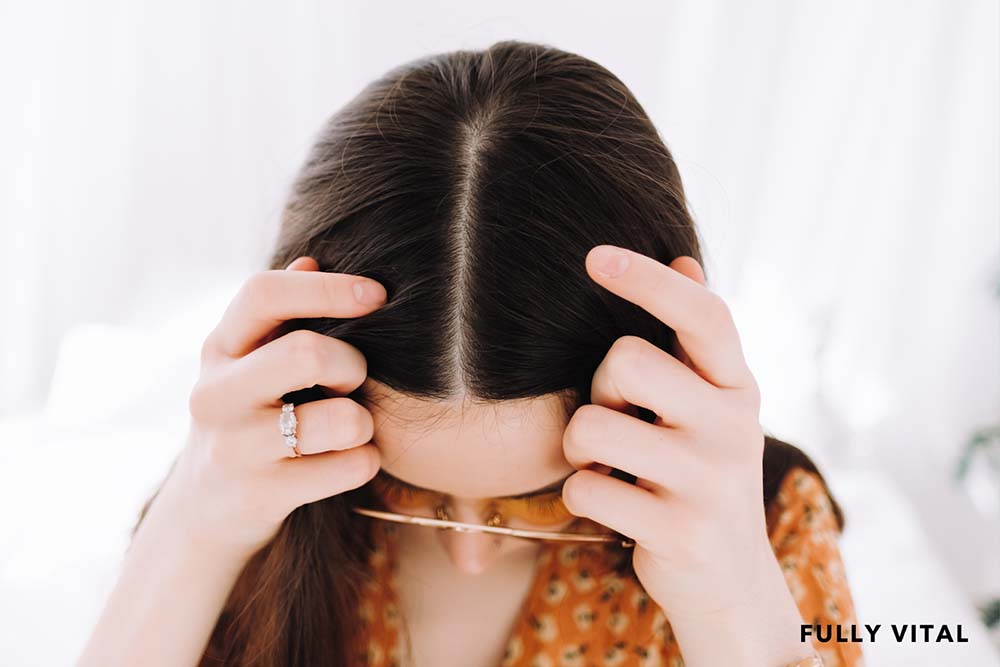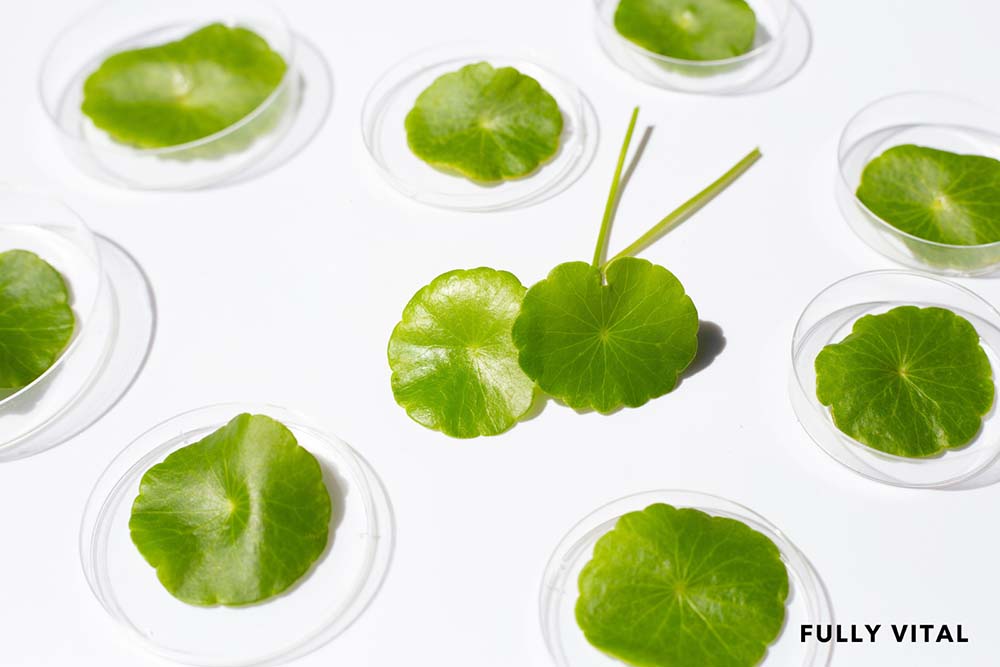
Hair Follicle: Importance And How To Take Care Of It
Are you tired of dealing with hair loss or the unwelcome appearance of gray hair? You're not alone.
Many women experience these concerns and seek effective solutions.
One crucial aspect of hair growth and pigmentation is the follicle.
In this article, we will delve into the concept of follicle, its significance in combating hair loss and graying, and explore alternative approaches. Let's unlock the secrets of healthy, vibrant hair!

I LOVE MY HAIR NOW
FullyVital hair serum and hair vitamins made tremendous improvements in my hair. I truly love my hair now.
Dorit S.,
What is Follicle?
The follicle is a small, dynamic structure located within the skin that houses the root of each hair strand.
It serves as a protective sheath and plays a vital role in hair growth.
Each hair follicle consists of different components, including the dermal papilla, sebaceous gland, and arrector pili muscle.
Together, they work harmoniously to facilitate the hair growth cycle.

Why is Follicle Important?
Understanding the importance of follicles is crucial when addressing hair regrowth and graying.
Hair follicles produce hair through a cyclical process involving stages of growth, regression, and resting.
A healthy follicle ensures optimal hair growth, strength, and pigmentation.
Any disruption to the follicle's function can lead to hair thinning, breakage, or graying.
Scientific studies have shown that the health of hair follicles is influenced by various factors, including genetics, hormones, diet, stress levels, and overall well-being.
By nurturing and supporting follicles, we can encourage healthier hair growth and combat the signs of aging, such as gray hair.(1)
What Are Some Benefits of Follicle?
Hair Growth
The primary benefit of a well-functioning follicle is promoting healthy hair growth. When the follicle is nourished and undamaged, it facilitates the production of strong and lustrous hair strands.Pigmentation
Follicles are responsible for the pigmentation of hair.
Melanin, the pigment that gives hair its color, is produced in the hair follicle.
Healthy follicles help maintain natural hair color, reducing the onset of premature graying.
Hair Thickness
A robust follicle promotes the growth of thicker hair shafts, providing volume and density to your locks.
Overall Hair Health
By focusing on follicle health, you improve the overall condition of your hair.
Strong and healthy follicles lead to resilient, vibrant hair that resists breakage and damage.
What Are The Alternatives to Follicle?
While the follicle is integral to hair growth, there are alternative methods and treatments available to complement and enhance its function.
Some approaches include:
Nutrition and Supplements
A balanced diet rich in essential nutrients, such as biotin, vitamins A, C, and E, and minerals like iron and zinc, can support hair follicle health.
Consult with a healthcare professional to determine the right supplements for your needs.
Scalp Massage
Regular scalp massages improve blood circulation to the hair follicles, promoting their health and stimulating hair growth.
Hair Care Routine
Adopting a gentle hair care routine that includes sulfate-free and nourishing products can help maintain the integrity of the follicles, preventing damage and breakage.Topical Treatments
Certain topical treatments, like minoxidil, have shown effectiveness in promoting hair growth. Consult a dermatologist for personalized recommendations.
What Is The Historical Use And Significance Of Follicles In Various Contexts?
The significance of hair and its follicles can be traced back throughout history.
Across cultures, hair has been viewed as a symbol of beauty, vitality, and social identity.
Ancient remedies and practices focused on maintaining healthy hair follicles through natural ingredients and holistic approaches.
While historical records provide insights into traditional beliefs and practices, it's important to note that modern scientific research and advancements provide a deeper understanding of follicle function and effective interventions for hair regrowth.
What Are The Current Advancements And Challenges In The Present Environment?
In the present era, scientific advancements and technological breakthroughs have shed new light on hair follicle research.
Researchers continue to explore the intricate mechanisms involved in follicle development, hair growth cycles, and the factors influencing follicle health.(2)
Furthermore, the current environment offers a wide array of innovative treatments and products aimed at optimizing follicle function and combating hair loss.
From FDA-approved medications to laser therapies and regenerative medicine approaches, individuals now have access to a range of options tailored to their specific needs.
However, it is important to navigate the current landscape with caution.
With the abundance of information and products available, it can be overwhelming to discern effective interventions from dubious claims.
Seeking guidance from trusted healthcare professionals and dermatologists is crucial to make informed decisions about hair regrowth treatments.
What Are The Potential Future Developments For Follicles?
As we move forward, the future of hair follicle research holds great promise.
Scientists are continuously unraveling the intricate cellular and molecular processes governing follicle development and hair growth.
This deeper understanding may pave the way for groundbreaking treatments and interventions that can revolutionize hair regrowth.(3)
Emerging fields such as stem cell research, gene therapy, and tissue engineering show potential in harnessing the regenerative abilities of hair follicles.
By leveraging these cutting-edge technologies, it may become possible to regenerate damaged or dormant follicles, leading to enhanced hair regrowth and improved outcomes for individuals experiencing hair loss or graying.
Additionally, ongoing research into personalized medicine and the role of genetics in hair follicle health opens doors to targeted treatments tailored to an individual's unique genetic makeup.(4)
This personalized approach has the potential to optimize treatment outcomes and provide more effective solutions for individuals seeking to restore their hair.
What are Hair Follicles Made Of?
Hair follicles are composed of a complex structure that includes several key components. The main elements found within hair follicles include:
Dermal Papilla
Situated at the base of the hair follicle, the dermal papilla is a small, cone-shaped projection of connective tissue.
It plays a crucial role in regulating hair growth and nourishing the hair follicle.
Epithelial Cells
The inner lining of the hair follicle consists of specialized epithelial cells.
These cells are responsible for producing the hair shaft and guiding its growth.
Sebaceous Gland
Attached to the hair follicle, the sebaceous gland produces sebum, a natural oil that moisturizes the hair and scalp.
Sebum helps maintain the health and flexibility of the hair strand.
Arrector Pili Muscle
The arrector pili muscle is a tiny muscle connected to the hair follicle.
When contracted, it causes the hair to stand on end, resulting in what is commonly known as "goosebumps."
How Many Follicles are Considered Normal?
The number of hair follicles on the scalp varies from person to person.
On average, individuals have approximately 100,000 to 150,000 hair follicles.
However, it is important to note that hair density can differ significantly depending on factors such as genetics, ethnicity, and individual characteristics.
Where are Hair Follicles Found?
Hair follicles are present throughout the body, with the highest concentration found on the scalp.
In addition to the scalp, hair follicles can be found on other areas such as the eyebrows, eyelashes, beard, chest, arms, legs, and pubic region.
Each region may have variations in hair thickness, length, and growth cycles.
Are Follicles Good or Bad?
Hair follicles themselves are neither inherently good nor bad.
They are a natural part of the human body and play a vital role in hair growth.
However, issues can arise when hair follicles are damaged, become blocked, or experience disruptions in their function, leading to conditions such as hair loss, scalp disorders, or infections.
The health and proper functioning of hair follicles are essential for maintaining healthy, vibrant hair.
Can Hair Follicles Get Infected?
Yes, hair follicles can become infected, a condition known as folliculitis.
Folliculitis occurs when bacteria, fungi, or other microorganisms enter and infect the hair follicle.
Common causes of folliculitis include bacterial or fungal overgrowth, improper hair removal techniques, excessive sweating, and compromised immune function.
Symptoms of folliculitis include redness, swelling, tenderness, and the formation of pustules or small bumps around the affected follicles.
Proper hygiene, avoiding excessive heat or moisture, and using gentle hair care practices can help prevent folliculitis.
In severe cases, medical intervention may be required to treat the infection and restore follicle health.
Remember, maintaining a clean and healthy scalp environment is crucial for preventing infections and preserving the optimal function of hair follicles.
Ready to unlock the potential of your hair follicles and experience vibrant, luscious locks? Look no further than Fully Vital's Powerful Vegan Hair Regrowth System for Women.
-
Stimulates Hair Follicles: Our advanced formula harnesses the power of four different stimulation methods to awaken dormant follicles and promote healthy hair growth.
- Just 2 Minutes a Day: Busy schedule? No problem.
With our time-efficient regimen, you can incorporate our system seamlessly into your daily routine, dedicating just two minutes a day to nurture your follicles.
- 120-Day Money-Back Guarantee: We stand behind the effectiveness of our product.
If you're not completely satisfied with your results within 120 days, we offer a full money-back guarantee. Your satisfaction is our top priority.
Join countless women who have embraced Fully Vital's Vegan Hair Regrowth System and witnessed remarkable transformations.
Take the first step towards rejuvenating your hair today.
Unlock the potential of your follicles.
Choose Fully Vital and experience the beauty of healthy, revitalized hair.
Final Thoughts on Follicle
Understanding the intricate role of hair follicles in the process of hair regrowth is essential for those seeking effective solutions to combat hair loss and graying.
By delving into the functions, benefits, and historical significance of follicles, we have gained valuable insights into the foundations of healthy and vibrant hair.
At Fully Vital, we are dedicated to providing women with powerful solutions to nurture their follicles and promote optimal hair regrowth.
Our Vegan Hair Regrowth System for Women is designed to stimulate hair follicles in four different ways, harnessing the power of natural ingredients to support healthy hair growth.
With just two minutes of daily use, our product offers a convenient and time-efficient solution for those seeking to revitalize their hair.
We believe so strongly in the effectiveness of our product that we offer a 120-day money-back guarantee.
We are committed to your satisfaction and confident in the transformative potential of our Vegan Hair Regrowth System.
Take charge of your hair regrowth journey today and experience the difference that Fully Vital can make.
Embrace the power of healthy follicles and rediscover the beauty and confidence that comes with vibrant, lustrous hair.
Remember, your hair's vitality begins with the follicles.
Invest in Fully Vital's Vegan Hair Regrowth System for Women and unlock the potential of your follicles for a revitalized and radiant mane.
Frequently Asked Questions About Follicle
Can stress impact follicle health and contribute to hair loss?
Yes, scientific studies have demonstrated a link between chronic stress and hair loss.
Stress can disrupt the hair growth cycle and lead to temporary or permanent hair loss.
Finding stress-management techniques, such as exercise, meditation, or counseling, may help promote healthy follicle function.
Are there specific foods that support follicle health?
While no single food can guarantee hair regrowth, a balanced diet rich in proteins, fruits, vegetables, whole grains, and healthy fats provides the necessary nutrients for follicle health.
Including foods like salmon, spinach, eggs, nuts, and seeds can be beneficial.
Does age affect follicle function?
As we age, follicle function may naturally decline, leading to changes in hair thickness and pigmentation.
However, maintaining a healthy lifestyle, managing stress, and following a nutrient-rich diet can help optimize follicle health and minimize age-related hair changes.
Can hair follicles be rejuvenated or regenerated?
While hair follicles cannot be completely regenerated or rejuvenated, there are treatments available that can help improve their function and stimulate hair growth.
Techniques such as platelet-rich plasma (PRP) therapy and low-level laser therapy (LLLT) have shown promising results in enhancing follicle health and promoting hair regrowth.
These treatments work by increasing blood flow, delivering essential nutrients, and activating dormant follicles.
Are there any natural remedies or herbs that support follicle health?
Some natural remedies and herbs are believed to support follicle health, although scientific evidence is limited.
Examples include saw palmetto, rosemary oil, lavender oil, and pumpkin seed oil.
These remedies are thought to have properties that may promote hair growth or inhibit hair loss.
However, it's important to consult with a healthcare professional before using any herbal remedies to ensure safety and effectiveness.
Can hair follicles be damaged by heat styling tools?
Excessive heat styling, such as using flat irons, curling irons, or blow dryers at high temperatures, can damage the hair shaft and potentially affect the health of the hair follicles.
Heat can cause the proteins in the hair to weaken, leading to breakage and brittleness.
To minimize damage, it is advisable to use heat styling tools sparingly, apply a heat protectant product, and set the tools to lower temperatures.
Do hair follicles contribute to scalp conditions like dandruff?
Hair follicles themselves do not directly cause scalp conditions like dandruff.
However, the health and proper functioning of hair follicles are intertwined with overall scalp health.
Imbalances in the scalp's natural oil production, sensitivity to certain fungi, or an overgrowth of yeast can contribute to dandruff.
Maintaining a clean scalp, using gentle and appropriate hair care products, and managing scalp moisture levels can help minimize dandruff symptoms.
Can hormonal changes affect the activity of hair follicles?
Yes, hormonal changes can impact the activity of hair follicles.
Fluctuations in hormone levels, such as during pregnancy, menopause, or certain medical conditions, can influence the hair growth cycle.
Hormonal imbalances can lead to temporary hair shedding or changes in hair thickness.
Consulting with a healthcare professional or dermatologist can help identify and address underlying hormonal issues affecting hair follicle function.
Are there any medical conditions that can damage hair follicles?
Certain medical conditions can negatively affect hair follicles.
Examples include autoimmune disorders like alopecia areata, which causes hair loss in patches, and scalp conditions like cicatricial alopecia, characterized by inflammation and scarring of the hair follicles.
Additionally, medical treatments such as chemotherapy can temporarily damage hair follicles, leading to hair loss.
Managing underlying medical conditions and seeking appropriate medical care can help address and minimize follicle damage associated with these conditions.
Remember, for personalized advice and treatment options regarding hair follicle health, it is recommended to consult with a qualified healthcare professional or dermatologist.
Sources:
- Grymowicz, Monika, et al. “Hormonal Effects on Hair Follicles.” International Journal of Molecular Sciences, vol. 21, no. 15, 28 July 2020, p. 5342, https://doi.org/10.3390/ijms21155342.
- Kesika, Periyanaina, et al. “Role and Mechanisms of Phytochemicals in Hair Growth and Health.” Pharmaceuticals, vol. 16, no. 2, 1 Feb. 2023, p. 206, www.mdpi.com/1424-8247/16/2/206, https://doi.org/10.3390/ph16020206.
- Cotsarelis, George, and Sarah E Millar. “Towards a Molecular Understanding of Hair Loss and Its Treatment.” Trends in Molecular Medicine, vol. 7, no. 7, July 2001, pp. 293–301, https://doi.org/10.1016/s1471-4914(01)02027-5. Accessed 21 Sept. 2021.
- Ji, S., Zhu, Z., Sun, X., & Fu, X. (2021, February 17). Functional hair follicle regeneration: An updated review. Nature News. https://www.nature.com/articles/s41392-020-00441-y







